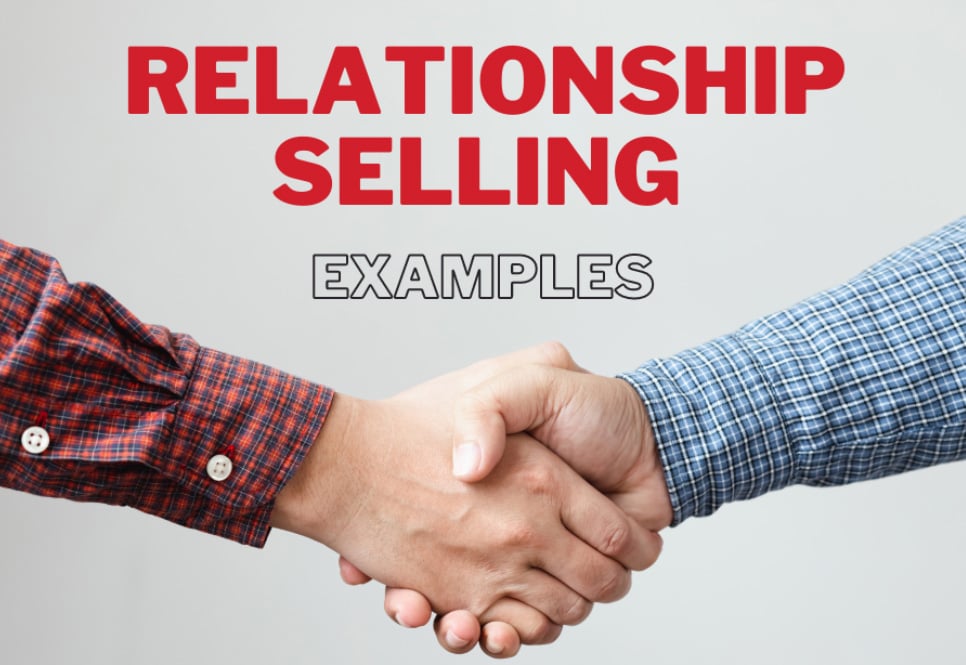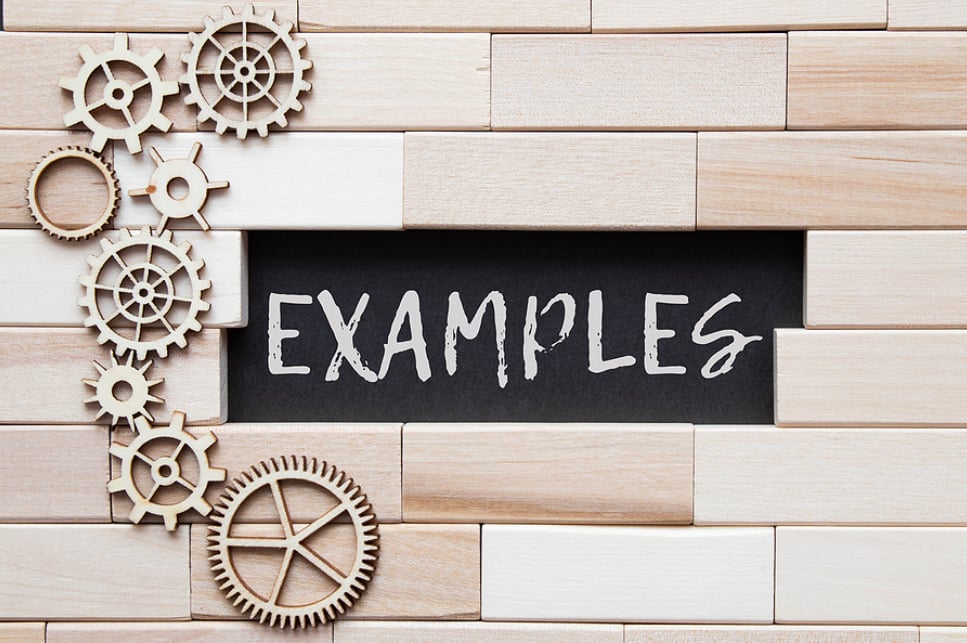Written by Sean McPheat | 

Relationship selling, also commonly known as consultative sales or trust-based selling, is a sales technique that uses relationship building to close deals.
The best sales techniques are based on building a connection with the customer, creating an atmosphere of trust and understanding, and delivering value. By connecting with potential customers emotionally and personally, relationship selling helps create strong, long-lasting customer relationships.
If you’re looking to improve the skills of your sales team and reap the many benefits of relationship selling, then effective Sales Training is a must. The aim of this blog is to provide some real-life examples of relationship-selling techniques and how you can use them to make your sales conversations more successful.
So, if you want to take your sales game to the next level, the techniques and insights below will help boost your sales results.
Contents

The definition of relationship selling is the opposite of the stereotypical ‘close at all costs’ view of sales. Instead relationship selling encourages honest conversations to build trust and empathy between the salesperson and the customer.
At its core, a relationship selling approach is about creating an atmosphere of mutual understanding where both the seller and buyer benefit from each other’s knowledge. When used effectively, relationship-selling techniques can help create repeat customers and customers who are loyal to your brand.
This two-way street is perhaps best summed up by Jim Cathart in his book, Relationship Selling:
“Relationship selling is a form of selling, not merely a type of relationship. The purpose of it is to help other people at a profit. When you are truly helping, you deserve to be well compensated for your product or service.”
By prioritising their connection with their customer over other aspects of the traditional sales process, sales reps can provide material value without impacting the seller’s bottom line.
Relationship selling techniques are effective because it taps into the growing customer expectation for personalisation in their customer experience. Research by Hubspot indicates that 70% of B2B customers expect in-depth personalisation and would be willing to switch services if they don’t get it.
By building a relationship that makes customers feel like a partner rather than just part of a transaction, relationship selling helps to create long-lasting customer relationships and boost sales.
While each company will have its own individual process for relationship selling, there are five key stages to the process, sometimes known as the ‘Five A’s.’
These generalist steps can be applied to any type of customer interaction, whether it’s an in-person meeting or telesales. They can be adapted to suit the needs of individual customers.

There are a number of material benefits to using relationship selling techniques, including:
By demonstrating that you are genuinely trying to add value to the customer’s experience and genuinely care about their needs, relationship selling helps build long-term relationships with customers.
Even if you don’t close the sale, reinforcing your reputation as a trusted advisor can help you establish relationships that may reward you with repeat business down the road.
When customers feel like their relationship with your brand is more than just transactional, they are far more likely to view your products or services favorably and be loyal to your company in the future.
This is especially important for companies in the B2B space, where long-term relationships are essential for ensuring customer loyalty.
Relationship selling for B2B customers can help build trust and understanding and provide ongoing value through advice and insights.
Customer relationships built on trust and understanding open up more avenues for cross-selling and upselling opportunities than those built solely on transactions.
When customers have a good relationship with your brand, they’re far more likely to be open to hearing about your new products and services. This creates more opportunities for generating additional revenue from existing customers.
Customer service isn’t just the purview of your customer service team, it should be an ongoing effort throughout your company. Relationship selling helps create a customer service experience that is far more focused on creating value for the customer than simply trying to make a sale.
By focusing on adding value through advice, insights and support, relationship selling helps brands deliver better overall customer service to their customers.
If you’re looking for more hints and tips on this, check out our customer service skills blog.
The reality is that customers value a personalised experience that offers genuine value over incremental decreases in price. Relationship selling helps create positive customer relationships that can lead to repeat business and referrals.
As customers become more familiar with your brand, they are also more likely to reach out when they need services or advice rather than seeking out competitors. This means that relationship-selling techniques are essential for creating long-term customer loyalty.
As you can see, relationship selling isn’t just about closing sales. It’s about creating relationships that deliver long-lasting value to the customer. By taking a consultative approach to customer interactions, brands can ensure that their customers get the most out of their relationship with them.
This means taking time to understand the customer’s specific needs and providing advice and guidance on how your services or products can help them. It’s also important to remember that customers appreciate being listened to and value a brand that takes the time to understand their pain points and come up with solutions tailored to their individual needs.
At the end of the day, relationship selling is about building relationships of trust with your customers. By investing in these relationships, you can create customers who are loyal to your brand and who will come back time and time again.

Now that you’ve got a clearer idea of what relationship selling is, and the benefits of using a relationship-selling approach, let’s look at some real-world examples of how relationship-selling techniques can be used to build strong customer relationships.
A B2B company that sells marketing services sends out weekly newsletters to their customers with curated content related to the customer’s industry and interests. They also tailor the content to each customer based on their individual needs and preferences.
This is a great example of relationship selling, as it demonstrates that the company is taking the time to understand its customer’s needs and provide them with tailored content. This kind of personalisation shows customers that you care about their experience and are trying to add value to their lives.

A B2C company that sells beauty products offers discounts to customers who make repeat purchases. This incentivises customers to stick with the brand and gives them an added benefit for being loyal.
This is another example of relationship selling, as it shows customers that their loyalty is rewarded and encourages them to continue their relationship with the brand. It also demonstrates that the company values their customers and is willing to give back in return for their loyalty.
A B2B company selling SAAS services takes the time to get to know its high-value customers. They make sure to check in regularly and provide regular updates on the company’s progress. This gives high-value customers a sense of connection with the brand and encourages them to continue working with the company in the long term.
This is an example of relationship selling, as it shows that the company is taking the time to build relationships with its most valuable customers. It also demonstrates that the company values its customer’s opinions and is willing to go the extra mile to keep them happy.
A B2C company that sells outdoor gear works with customers to develop tailored solutions for their needs. They use a consultative approach, asking detailed questions about customers’ goals and needs and then offering advice on the best products for the customer based on their individual situation.
This kind of problem-solving creates a personalised experience for the customer and shows that you understand their particular needs and are willing to go the extra mile to provide them with the best solution.
A B2B company that provides IT services makes sure to provide ongoing support to customers after the sale has been made. They check in regularly with customers and offer advice on how they can get even more value out of the services they have purchased.
This is another example of effective relationship selling, as it shows that the company values its customers and is willing to continue providing them with a high level of service even after the sale has been completed. It also demonstrates that the company is committed to helping its customers get the most out of their purchases.
Listening is a critical part of relationship selling. It’s important to take the time to listen to what your customers have to say and understand their pain points. Doing this will ensure that your solutions are tailored to their needs and provide a better customer experience.
For example, if you’re a B2B sales rep selling accounting software, listening to your customers and understanding their specific needs is important. This will help you provide the best solution for them and show that you care about helping them achieve their goals.

It’s also important to be empathetic with your customers and show them that you understand their situation. This can be done through active listening and by demonstrating that you care about the customer’s experience with your product or service.
Studies show that indifference on the part of salespeople leads to losing 68% of customers, as customers want to feel heard and valued. Showing that you care about them as individuals and understand their needs goes a long way in building strong customer relationships.
For example, if a customer is having trouble using your software, don’t just offer them technical support; take the time to understand how they’re feeling and provide solutions tailored to their experience with the software. This will show them that you understand their problem and are committed to helping them solve it.
Trust is an essential part of any customer relationship, so it’s important to take the time to build a trusting relationship with your customers. This can be accomplished by being honest and transparent about your product or service, responding quickly to customer inquiries, and providing reliable customer service.
For example, if your B2B company sells a cloud-based solution, ensure you are honest about what the solution can and cannot do. This will help build trust with your customers and demonstrate that you value their experience.
Asking the right questions is another important skill for relationship selling. Taking the time to understand your customer’s needs and goals can help you provide the best solution for them, and asking good questions shows that you care about their experience.
For example, a B2C company selling outdoor gear should ask customers detailed questions about their individual needs and preferences. This will help them provide the best products for each customer, and customers will appreciate that the company cares enough to ask.
Relationship selling is a long game, and modern sales teams need to make use of social media to stay connected with their customers. Social media can be used to provide updates on new products or services, answer customer inquiries in real time, and offer discounts or promotions.
Research also shows that a stunning 84% of CEOs and VPs turn to social media to make buying decisions. This means that using social media to build relationships with customers is an important part of relationship selling.

The relationship selling approach is a powerful tool for sales teams to build strong customer relationships, leading to increased sales, better customer service, and more repeat business.
By using the techniques outlined in this article, you can create an effective approach to relationship selling that will help create long-lasting customer relationships and increase your team’s overall success.
MDT Sales Training offers a range of comprehensive and engaging Selling Skills Training programs that will help you and your team develop the crucial skills required for successful relationship selling.
Build your team’s questioning skills with our our Online Sales Courses.
With MDT Sales Training, you can equip your team with the skills they need to build strong customer relationships and increase your company’s bottom line.
Start building better customer relationships today – contact us today to get started!
Or take a look at our full portfolio of Sales Training Courses.
Happy Sales Hiring!
Sean

Sean McPheat
Managing Director
MTD Sales Training
Updated on: 19 September, 2023
Related Articles

Search For More
